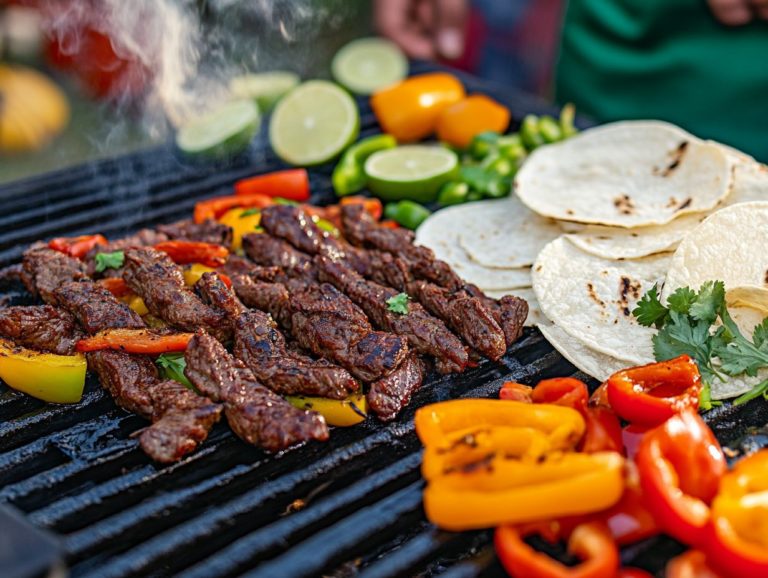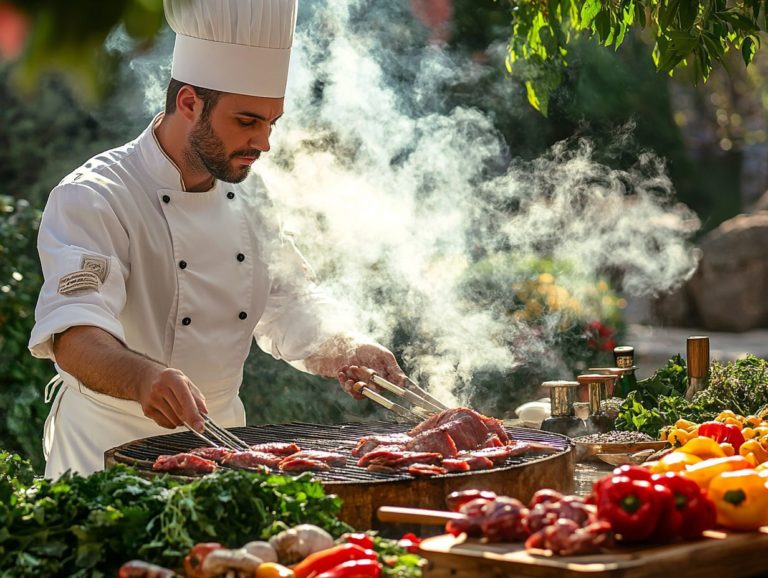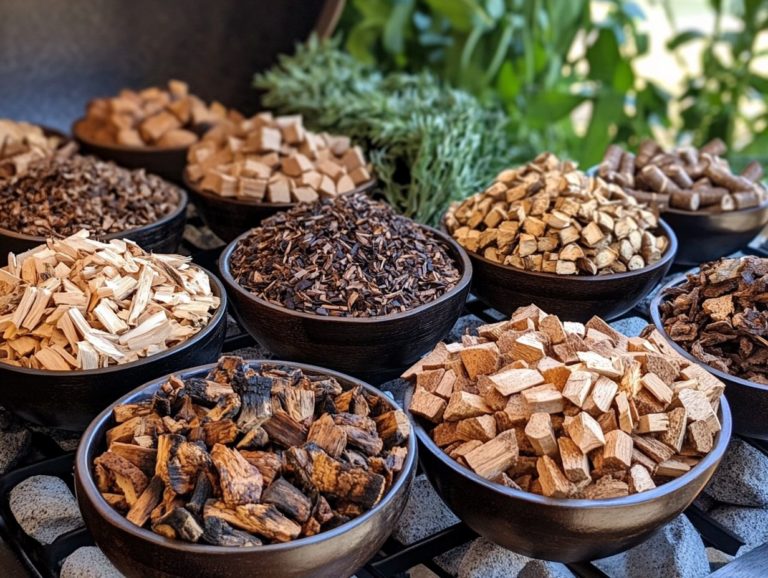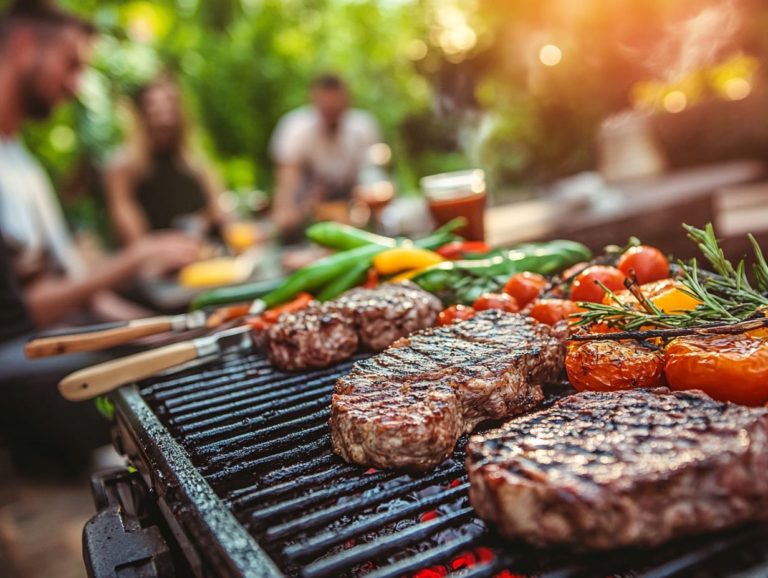Grilling Chicken: Techniques for Juicy and Tender Meat
Get ready to fire up the grill! Grilling chicken is not just cooking; it’s a delicious adventure that will impress your family and friends. It transforms your meals into a symphony of mouthwatering flavors and tender, juicy perfection.
As you delve into the world of outdoor cooking, you’ll uncover numerous benefits from enhancing the taste to promoting healthier eating options. Grilling chicken is a fantastic way to enjoy delicious barbecue in the summer. Master the craft of preparing your chicken with effective ways to marinate and season, and explore different grilling methods that yield various flavors and textures for flawless results every time.
This guide will help you navigate common grilling pitfalls, suggest delectable pairings, and offer essential safety tips to ensure your meal is both enjoyable and safe.
Whether you re a seasoned griller or just stepping into the arena, you ll find that this guide elevates your chicken grilling game to new heights.
Contents
- Key Takeaways:
- Preparing Chicken for Grilling
- Grilling Techniques for Juicy and Tender Chicken
- Troubleshooting Common Grilling Issues
- Serving and Pairing Suggestions
- Safety Tips for Grilling Chicken
- Frequently Asked Questions
- What are the best techniques for grilling chicken to achieve juicy and tender meat?
- How long should I marinate chicken before grilling?
- What are some good marinade recipes for grilling chicken?
- How do I grill chicken using indirect heat?
- Can I use a thermometer to check the doneness of grilled chicken?
- What is the best way to prevent grilled chicken from sticking to the grill?
Key Takeaways:
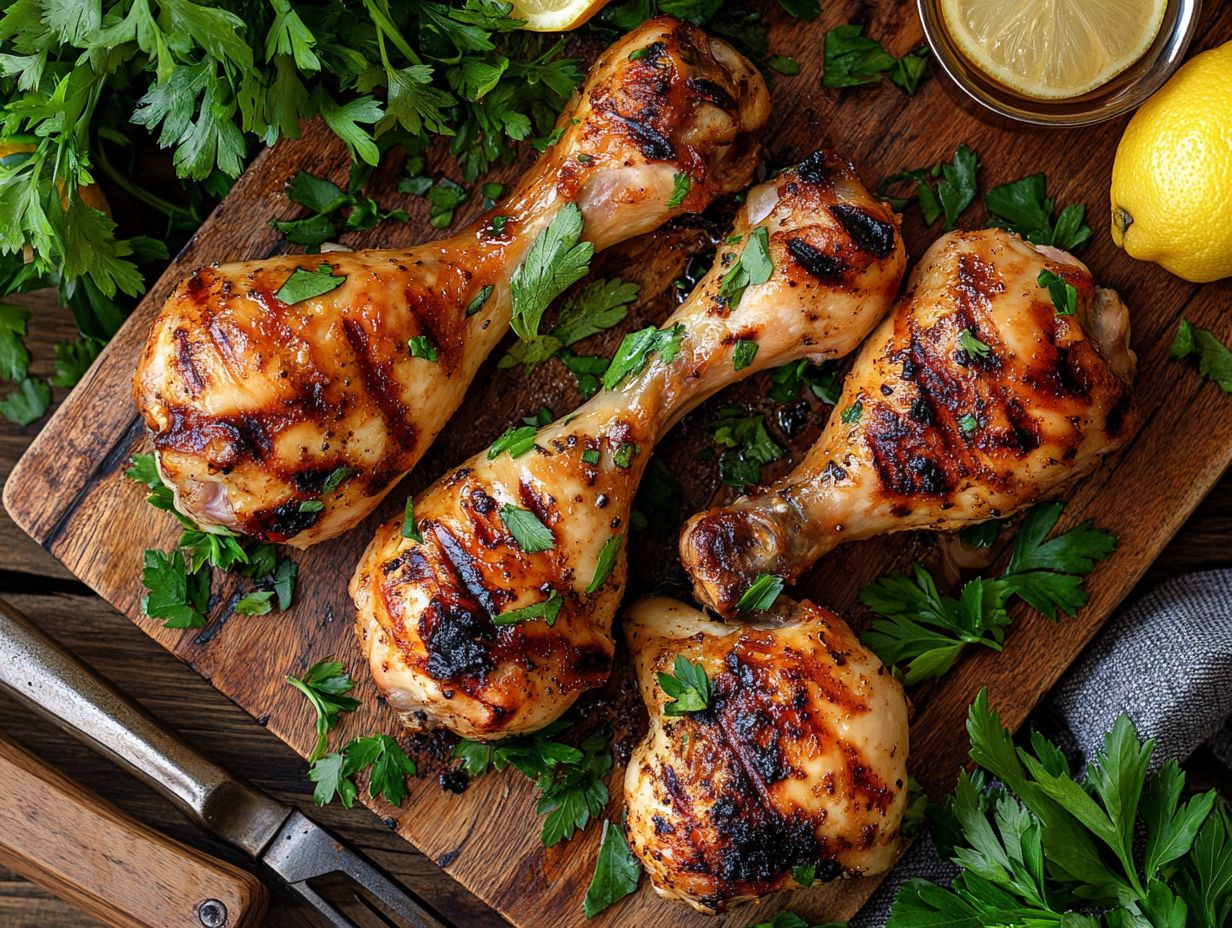
- Proper preparation is key for juicy and tender grilled chicken. Marinating and seasoning enhance flavor and moisture.
- For crispy skin, cook over direct heat; use indirect heat for evenly cooked meat. A meat thermometer ensures perfect doneness and avoids overcooking.
- Avoid dry or burnt chicken by monitoring temperature and using safe grilling practices. Serve with flavorful accompaniments and practice food safety measures to prevent foodborne illnesses.
Benefits of Grilling Chicken
Grilling chicken adds flavor and makes it a healthier choice. The smoky aroma and grill marks create an irresistible dish, transforming a perfectly grilled chicken breast or thigh into a mouthwatering masterpiece. Grilling locks in natural juices for tender, juicy chicken. It s the perfect way to enjoy a variety of flavors at your outdoor gatherings, making it an ideal choice for any chicken entr e on your menu.
As you grill, you ll notice the reduced fat content from the excess grease that drips away, rendering it a heart-healthy option. The grilling process promotes caramelization, enhancing the flavor profile and giving your chicken a rich, savory taste. Thanks to chicken’s versatility, you can easily marinate it with a plethora of spices and herbs or pair it with an array of sides, from fresh salads to roasted vegetables.
Using different cooking techniques turns every meal into a delightful culinary adventure that keeps your summer dining exciting and satisfying.
Preparing Chicken for Grilling
Get ready for grilling success! Proper preparation is key in achieving exceptional results. Techniques like brining soaking in a salty solution to enhance flavor and marinating significantly enhance both flavor and tenderness.
Ensuring that the chicken is evenly thick promotes uniform cooking, allowing the heat to penetrate effectively. This meticulous approach leads to perfectly cooked chicken breasts and thighs.
By adopting these preparatory steps, you elevate the flavor profile, creating a delightful grilling experience you re sure to savor.
Marinating and Seasoning Techniques
Marinating and seasoning your chicken are essential techniques that can elevate the flavor of your grilled masterpiece. For those looking to enhance their grilling skills further, exploring grilling lamb techniques for optimal flavor can ensure a meal that’s not just delicious but also succulent.
A well-crafted chicken marinade usually includes a drizzle of olive oil for added flavor. Add fresh garlic for a punch and lemon juice to brighten the flavor profile.
Using a zip-top bag makes marinating easy and clean. The key is to let the chicken absorb those enticing ingredients for a juicy and tender dish.
Exploring different marinating techniques can enhance your grilling experience. A dry rub can bring aromatic spices to the forefront, while timing is crucial.
Letting it marinate longer leads to deeper flavors, transforming ordinary chicken into an extraordinary dish that will dazzle your palate.
Grilling Techniques for Juicy and Tender Chicken
Mastering various grilling techniques will boost your grilling game! The right methods keep the meat moist while showcasing those coveted grill marks.
Here are some essential grilling tips: maintain a consistent grill temperature, master direct and indirect heat methods, and cut your chicken into even portions. For more detailed advice, check out the best grilling techniques for beginners.
This approach enhances the texture and guarantees every bite bursts with flavor and succulence.
Direct and Indirect Heat Methods

Direct and indirect heat methods are essential grilling techniques that influence how your chicken cooks. Direct heat is perfect for quickly preparing smaller portions like chicken breasts.
In contrast, indirect heat allows for a slower cooking process, making it ideal for larger cuts. Chicken thighs are particularly flavorful when grilled this way.
Knowing when to use each method is vital for grilling perfection. Chicken breasts thrive with direct heat, requiring about 6 to 8 minutes per side for a delightful crust while retaining moisture.
On the other hand, chicken thighs and whole birds do better with indirect heat, which takes around 30 to 40 minutes, allowing flavors to meld beautifully.
By combining these methods thoughtfully, you create tender, flavorful dishes that cater to various palates and grilling occasions.
Using a Meat Thermometer
Using a meat thermometer is essential when you re grilling chicken. This ensures your chicken is cooked to the proper internal temperature for safety and juiciness. Cooking chicken properly means keeping an eye on the cooking time based on the thickness of your chicken and the specific cut, as well as the heat of your grill.
For instance, chicken breasts should reach an internal temperature of 165 F to guarantee they re safe to eat while remaining tender. To achieve the best results, insert the thermometer into the thickest part of the chicken, avoiding the bone for an accurate reading. Check the temperature during the last few minutes of grilling. This allows you to make any necessary adjustments.
For dark meat cuts like thighs and drumsticks, aim for a slightly higher internal temperature of around 175 F for optimal flavor and texture. Let the chicken rest for a few minutes before slicing. This key step allows the juices to redistribute, ensuring each bite is succulent and bursting with flavor.
Troubleshooting Common Grilling Issues
Troubleshooting common grilling issues is vital for refining your grilling skills, especially for achieving perfectly juicy, non-burnt chicken. Various factors can contribute to inconsistency, such as grill heat, incorrect cooking times, and uneven thickness in your chicken portions. These can lead to less-than-stellar results.
Mastering how to tackle these challenges not only expands your grilling techniques but also guarantees that every piece of chicken emerges flawlessly cooked, ready to impress.
Dry or Burnt Chicken
No one wants to bite into dry or burnt chicken while grilling! This can happen due to too much heat or not enough cooking time. Keep your chicken juicy by monitoring cooking times and resisting the urge to flip it too often; frequent flipping can disrupt the grilling process and lead to burnt edges.
Proper marination and seasoning are key, as they help to lock in moisture while enhancing flavor and tenderness. The real trick is mastering the balance between heat and cooking time. A grill thermometer can be a game-changer, helping you maintain medium-high heat, usually around 350 F to 400 F.
Adjust the cooking time based on the chicken’s thickness; thicker pieces often need a lower temperature for longer to cook evenly. A well-crafted marinade think lemon juice or vinegar can elevate juiciness and ensure your barbecue experience is delightful.
Inconsistent Cooking
Inconsistent cooking is a challenge many grillers face, leading to unevenly cooked chicken that impacts both taste and safety. Factors such as fluctuating grilling temperatures, improperly sized chicken portions, and variations in thickness contribute to this dilemma, often resulting in some pieces being overcooked while others are undercooked.
To reduce the risk of inconsistent cooking, prioritize uniformity in chicken portions and maintain consistent grilling techniques. Consider implementing the following strategies:
- First, use a meat mallet or rolling pin to ensure your chicken is of even thickness, promoting uniform cooking.
- Invest in a reliable grill thermometer to monitor temperature fluctuations and manage heat effectively.
- Preheat your grill to the optimal temperature before placing the chicken on it.
- Move pieces around for even exposure to heat, enhancing your results.
By emphasizing these techniques, you ll elevate the flavor of your grilled chicken and foster a safer grilling environment. Apply what you ve learned to enjoy delicious grilled chicken!
Serving and Pairing Suggestions

Serving and pairing suggestions are essential for elevating your grilled chicken experience. They enable you to craft a well-rounded meal that truly showcases the flavors of your recipe.
Think about complementing your succulent grilled chicken with refreshing options like a zesty chicken salad or hearty side dishes such as grilled vegetables and roasted potatoes. These pairings won’t just enhance your meal; they also introduce a delightful array of textures and flavors, making your dining experience even more pleasurable.
Accompaniments and Side Dishes
When planning your meal around grilled chicken, choosing the right accompaniments can elevate your dining experience. Consider options like colorful chicken salads, crisp grilled vegetables, and comforting starches like garlic mashed potatoes or fluffy rice. Each pairing harmonizes beautifully with the flavors of the chicken.
In the summer, these sides do more than just complement the meal. They bring a refreshing touch that enhances the smoky, juicy essence of the chicken. Incorporating seasonal ingredients, such as heirloom tomatoes and fresh basil, allows you to create a delightful caprese salad that pairs well with grilled chicken.
Imagine a zesty corn salad featuring sweet summer corn, diced bell peppers, and a squeeze of lime for bright, tangy acidity. If you’re in the mood for something heartier, roasted sweet potatoes sprinkled with cinnamon provide both flavor and a vibrant pop of color to your plate.
Together, these accompaniments form a variety of flavors, showcasing the natural goodness of grilled chicken while celebrating the bounty of the season.
Safety Tips for Grilling Chicken
Safety tips for grilling chicken are vital to ensure a delicious and healthy dining experience. Improper handling can lead to foodborne illnesses, and you certainly want to avoid that.
It’s important to follow proper cooking techniques, such as preparing the chicken skin separately and ensuring that your grill grates are impeccably clean to prevent contamination. For enhanced flavor, consider using marinating tips for flavorful grilled meats. Use a meat thermometer to check the internal temperature. This not only offers peace of mind but also ensures your grilled chicken is safe, tender, and juicy.
Preventing Foodborne Illnesses
Preventing foodborne illnesses should be at the forefront of your mind when grilling chicken. Understanding safe grilling practices can dramatically reduce risks. Ensure that your marinated chicken is stored correctly, avoid mixing raw and cooked foods, and cook the bird to the proper internal temperature.
Keep your grilling tools sanitized and use separate utensils for raw and cooked chicken to elevate safety during your grilling experience. Keep your chicken at temperatures below 40 F before cooking. Remember, marinating chicken at room temperature is a no-go, as it can allow harmful bacteria to flourish.
Regarding cooking, a food thermometer is your best friend. It guarantees that the chicken reaches an internal temperature of at least 165 F, effectively wiping out any harmful pathogens. Don t forget about frequent handwashing and disinfecting surfaces after handling raw chicken. These simple steps create a solid barrier against contamination, ensuring a safer environment for everyone involved.
Frequently Asked Questions
What are the best techniques for grilling chicken to achieve juicy and tender meat?

There are a few techniques that can help you achieve juicy and tender chicken when grilling. First, marinate the chicken for at least 30 minutes before grilling to add moisture and flavor. Using grilling techniques like indirect heat and flipping the chicken often helps cook the meat evenly and keeps it juicy.
How long should I marinate chicken before grilling?
Marinate the chicken for at least 30 minutes before grilling. This helps the flavors penetrate the meat and makes it juicier.
What are some good marinade recipes for grilling chicken?
Try popular marinades like olive oil, lemon juice, garlic, and herbs.
You can also use barbecue sauce with honey and soy sauce, or a yogurt marinade with cumin and paprika.
How do I grill chicken using indirect heat?
For indirect heat, light one side of the grill. Place the chicken on the cooler side to cook it slowly and evenly.
Can I use a thermometer to check the doneness of grilled chicken?
Yes, a thermometer is the best way to check grilled chicken doneness. The chicken should reach an internal temperature of 165 F (74 C).
What is the best way to prevent grilled chicken from sticking to the grill?
To prevent sticking, keep the grill grates clean and oiled. Brush oil on the chicken too.

